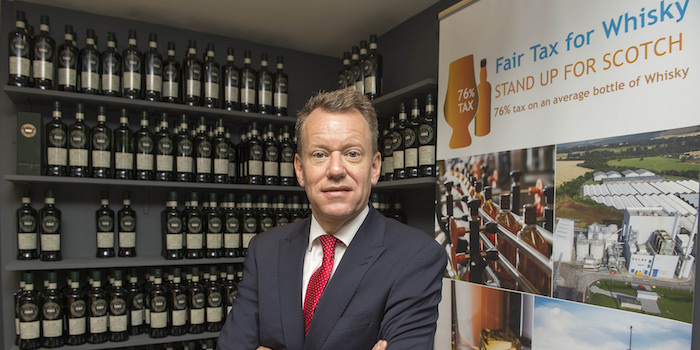A 2% tax cut last year on scotch prices drove $137 million in additional revenue for the United Kingdom treasury, according to the Scotch Whisky Association (SWA).
The cut was the UK’s first tax decrease on spirits in about 20 years. Although the SWA toasted the decision, which they say led more consumers to purchase bottles, the association now seeks further reductions.
Whisky produced in the UK is subject to a 76% tax, even after last year’s cut. Drinkers currently pay an estimated tax of about $14.50 on every scotch bottle they buy.
The SWA believes this percentage is too high compared with how much the UK taxes other alcohol categories. Moreover, the association points to the $137 million revenue boost — a 4% jump from 2014 — as proof of the positive affect of tax cuts.
“The Government’s own figures tell a simple story: when tax is too high, if you cut it, revenues go up not down,” said David Frost (pictured above), SWA chief executive, in a press release.
Thus, the SWA has launched a campaign, titled ‘Fair Tax for Whisky: Stand up for Scotch’, that asks Chancellor George Osborne for another 2% cut in the March budget.
In a poll of the British public, conducted by the SWA, more than ¾ of respondents supported the additional reduction.
Scotch is a top export and economic driver in the UK economy. It generated $3.572 billion in revenue for the treasury last year, up from $3.434 billion in 2014.
Fourth-fifths of all scotch bottles are sold overseas.
The industry supports 40,000 jobs in the UK, including 10,000 directly employed. There are 117 scotch whisky distilleries in the UK, with 30-40 new ones planned for the future.
“George Osborne listened to the industry last year when we said that a cut on duty would increase confidence, safeguard jobs, help consumers, and thereby ultimately benefit the Treasury,” Frost said. “We now have the figures to prove it. That’s why this year we are asking the Chancellor to continue what he has started. Deliver fair tax for whisky, free the industry to invest and grow, and feel the benefit through increased revenue.”





